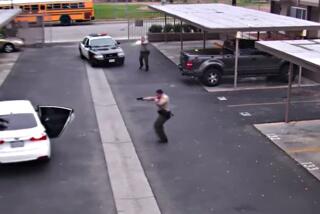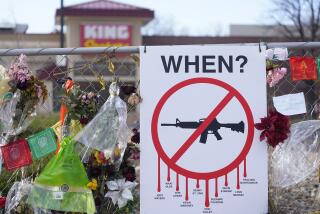Judge orders 4 more months of treatment for Tucson shooting suspect
Tucson shooting suspect Jared Lee Loughner, who is being held in a prison mental hospital, may soon be competent to stand trial for the rampage of 13 months ago, a federal judge said Monday in ordering another four months of anti-psychotic medication and therapy for him.
Loughner has made “measurable progress” under treatment at the Missouri hospital but “is not there yet” in terms of being able to assist in his own defense, said U.S. District Judge Larry A. Burns.
Loughner is charged with 49 felony counts stemming from the Jan. 8, 2011, attack at a meet-the-public event held outside a Tucson supermarket by then-Rep. Gabrielle Giffords. Six people, including a federal judge and a 9-year-old girl, were killed and Giffords and a dozen others were wounded. Giffords, a Democrat, resigned from her congressional seat last month to focus on her recovery.
Loughner, 23, was diagnosed with schizophrenia after Burns ordered an initial evaluation shortly after the shootings. In May, the judge deemed Loughner incompetent to stand trial for offenses that could lead to a death sentence if the government seeks one and he is convicted.
Loughner has become more cooperative with prison hospital staff and has been taking part in group therapy sessions, said Burns, citing a report from prison doctor Christina Pietz. The judge said the doctor’s report suggested that there was “substantial probability in the foreseeable future to restore his competency” and put him on trial.
Loughner’s lead attorney, Judy Clarke, told Burns she had no objections to his decision to keep her client in treatment for another four months. She is waging a separate battle in federal court against the manner in which Loughner is being treated, arguing that the anti-psychotic drugs being forced on him could harm or kill him. As a pretrial detainee not convicted of any crime, Loughner has the right to reject medication he doesn’t want, Clarke has said.
Neither Clarke nor Assistant U.S. Atty. Wallace Kleindienst, who appeared via video conference from Tucson, made any new proposals to Burns about the treatment he is being given at the U.S. Medical Center for Federal Prisoners in Springfield, Mo.
Burns said Loughner was obviously making progress.
“When I first saw him ... there was no way in my judgment then that he could have meaningfully participated in any kind of group therapy,” said Burns, a San Diego-based judge who was assigned to oversee the Loughner proceedings because of extensive publicity in the Tucson area and because one of those killed in the rampage was U.S. District Judge John M. Roll.
After Burns authorized the extension of Loughner’s commitment, he observed that it might be the last he would approve if the defendant wasn’t fit for trial by the June 7 end of the latest term. He said the court might need to “try something else” — an apparent reference to indefinite commitment.
Excerpts of the mental health reports read by the judge painted a picture of a much-improved defendant. Pietz’s report said Loughner’s speech had become “much more logical, linear and coherent,” and that he had ceased incessantly pacing his cell.
Attorneys for the government asked Burns to give them access to the prison doctors’ notes from discussions with Loughner, a request the judge said he was prepared to grant after reviewing the reports and deleting any information that might reflect confidential communications with his attorneys. Burns had earlier denied the government access to such detailed medical records because the private discussions between doctor and patient were unlikely to be admissible as evidence against him.
More to Read
Start your day right
Sign up for Essential California for news, features and recommendations from the L.A. Times and beyond in your inbox six days a week.
You may occasionally receive promotional content from the Los Angeles Times.






